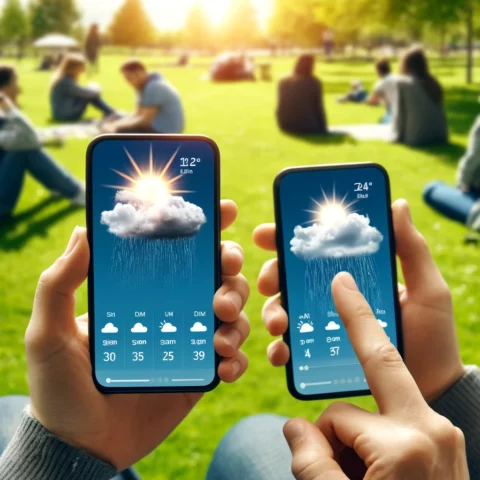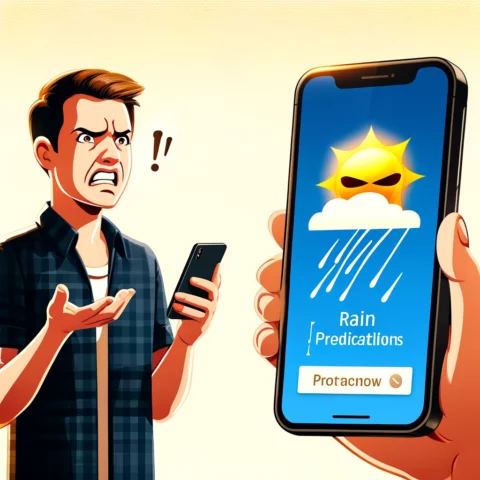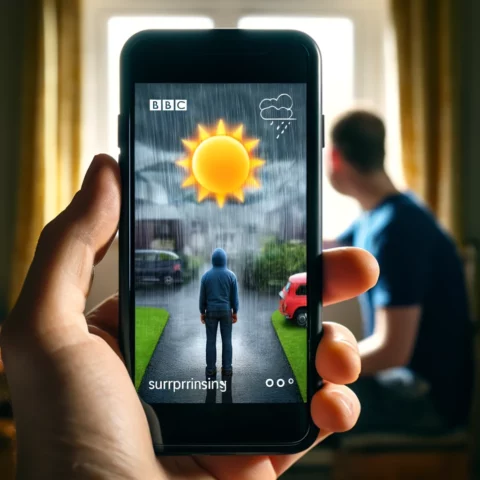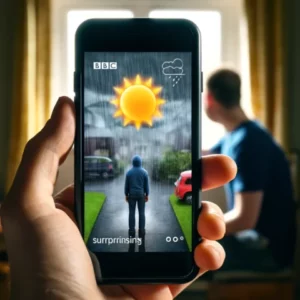Do you feel a dark cloud settling over your day when you check the BBC weather app? Have you geared up for rain only to walk your dog under a clear sky? There might be a simple explanation for this disconnect.
Is the BBC Weather App Too Pessimistic?
Users often suspect that the BBC’s method for selecting weather symbols tends to highlight the most pessimistic part of the forecast. “The day symbol reflects the weather conditions likely to have the greatest impact on people’s lives,” stated the BBC. This means that a brief period of adverse weather might be emphasized, even if the broader forecast is more favourable. The app’s predictions are designed to be interpreted alongside detailed, hour-by-hour updates that change with the latest data.
Impact on Daily Plans
Millions rely on the BBC weather app, which predicts mixed, wet weather for the Easter weekend, consistent with the ongoing rainy spell. This seemingly pessimistic forecasting approach can cause people to alter or cancel plans, which can be frustrating.
Gill Haigh, managing director of Cumbria Tourism, anticipates hundreds of locals visiting Windermere for various outdoor activities. She notes that businesses can be frustrated when the forecast suggests rain, even if the weather during peak visitor times is pleasant. “If it’s fine between 10 am and 3 pm, which is when most people visit, the forecast should reflect that accurately,” Haigh said.

The Hourly Update Conundrum
Although the BBC updates its forecasts hourly, the issue remains. For example, a snapshot for Orford, Suffolk, on Saturday morning showed rain for Easter Sunday, but the detailed forecast indicated dry weather until 6pm. Similar discrepancies appeared for Bourton-on-the-Water and Hull, where the detailed forecasts were more optimistic than the symbols suggested.
Changing Forecast Providers
Until 2016, the Met Office provided forecasting for the BBC, which now uses MeteoGroup, Europe’s largest private-sector weather company. MeteoGroup uses a different method for symbol selection, blending various forecast models for accuracy. This change has led to some differences in how weather predictions are presented, contributing to the perception of pessimistic forecasts.
Met Office vs. MeteoGroup
The Met Office and MeteoGroup use different methodologies for weather forecasting. The Met Office relies on the Unified Model, which integrates data from around the globe to produce weather forecasts. This model benefits from continuous updates and improvements driven by research and collaboration with other meteorological organizations.
MeteoGroup, on the other hand, uses multiple models, including the European Centre for Medium-Range Weather Forecasts (ECMWF) and the Global Forecast System (GFS). This approach allows MeteoGroup to compare and blend forecasts from different sources, aiming for a balanced prediction. However, the emphasis on worst-case scenarios in their symbol selection process can lead to a more cautious forecast presentation.
Comparing Weather Apps
Despite the concerns, weather apps like Apple Weather, BBC Weather, and the Met Office app generally offer reliable short-term forecasts and are highly rated on the Apple app store. However, Bill Giles, former head of the BBC’s meteorology department, explained that forecasters often err on the side of caution, a practice rooted in serving the air force. He emphasized the need for clarity in public forecasts to avoid unnecessary worry.
Apple Weather, for example, integrates data from The Weather Channel and other sources, offering a visually appealing and user-friendly interface. The Met Office app provides detailed local forecasts, severe weather warnings, and real-time observations, benefiting from its long-standing expertise in weather prediction.

Algorithm Limitations and Public Perception
Other platforms, including Apple Weather, have faced similar criticisms. Last year, an app crash led to widespread complaints about inaccurate rain predictions. Weather apps, reliant on algorithms, struggle more in regions with unpredictable climates. These limitations can lead to discrepancies in forecasts, affecting user trust.
The BBC stresses that the chosen day symbol does not impact the accuracy of its forecasts. However, the public perception remains that these symbols are overly gloomy. Understanding the methodology behind the forecasts and the emphasis on potential impact can help users better interpret the information provided.
Conclusion: Navigating Weather Forecasts
As we navigate our daily lives, weather forecasts play a critical role in our planning. Understanding the nuances of how these forecasts are generated and presented can help mitigate frustration. The next time you see a rainy symbol on your BBC weather app, delve into the detailed hourly forecast before cancelling your plans. You might find that the day isn’t as gloomy as it first appeared.
Stay Informed, Stay Flexible
Ultimately, staying informed and flexible with your plans can help you make the most of your day, rain or shine. As technology evolves, weather forecasting will continue to improve, striving to provide clearer and more accurate information for all of us.















